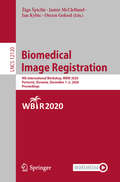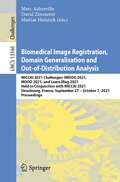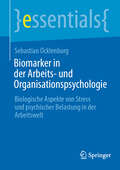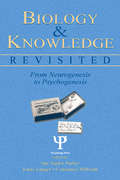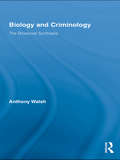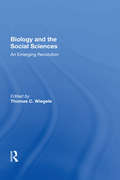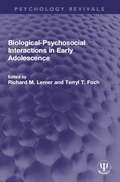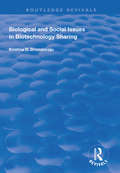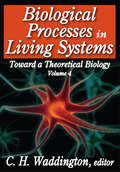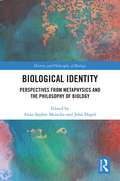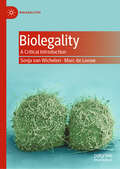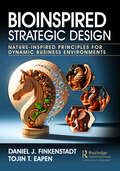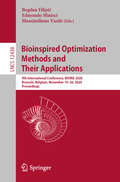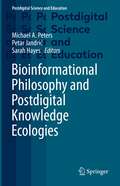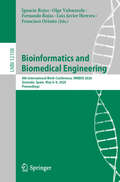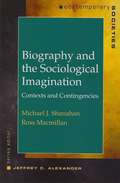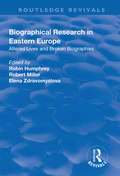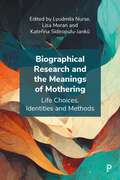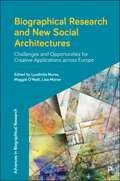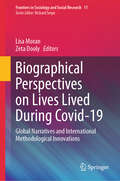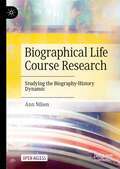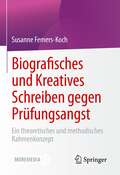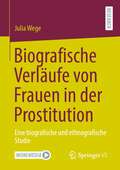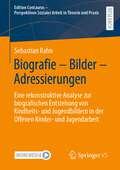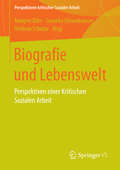- Table View
- List View
Biomedical Image Registration: 9th International Workshop, WBIR 2020, Portorož, Slovenia, December 1–2, 2020, Proceedings (Lecture Notes in Computer Science #12120)
by Orcun Goksel Žiga Špiclin Jamie McClelland Jan KybicThis book constitutes the refereed proceedings of the 9th International Workshop on Biomedical Image Registration, WBIR 2020, which was supposed to be held in Portorož, Slovenia, in June 2020. The conference was postponed until December 2020 due to the COVID-19 pandemic. The 16 full and poster papers included in this volume were carefully reviewed and selected from 22 submitted papers. The papers are organized in the following topical sections: Registration initialization and acceleration, interventional registration, landmark based registration, multi-channel registration, and sliding motion.
Biomedical Image Registration, Domain Generalisation and Out-of-Distribution Analysis: MICCAI 2021 Challenges: MIDOG 2021, MOOD 2021, and Learn2Reg 2021, Held in Conjunction with MICCAI 2021, Strasbourg, France, September 27–October 1, 2021, Proceedings (Lecture Notes in Computer Science #13166)
by Marc Aubreville David Zimmerer Mattias HeinrichThis book constitutes three challenges that were held in conjunction with the 24th International Conference on Medical Image Computing and Computer-Assisted Intervention, MICCAI 2021, which was planned to take place in Strasbourg, France but changed to an online event due to the COVID-19 pandemic. The peer-reviewed 18 long and 9 short papers included in this volume stem from the following three biomedical image analysis challenges: Mitosis Domain Generalization Challenge (MIDOG 2021), Medical Out-of-Distribution Analysis Challenge (MOOD 2021), and Learn2Reg (L2R 2021). The challenges share the need for developing and fairly evaluating algorithms that increase accuracy, reproducibility and efficiency of automated image analysis in clinically relevant applications.
Biomarker in der Arbeits- und Organisationspsychologie: Biologische Aspekte von Stress und psychischer Belastung in der Arbeitswelt (essentials)
by Sebastian OcklenburgDieses essential gibt einen Überblick über Biomarker-Forschung in der Arbeits- und Organisationspsychologie. Dabei werden die zentralen Biomarker und Methoden zur Erfassung von Biomarkern erläutert. Der Autor beleuchtet spezifisch relevante Biomarker für psychische Erkrankungen im Kontext der Arbeitswelt sowie Biomarker für psychische Belastungsfolgen der Arbeit wie Burn-out. Das essential endet mit einer praxisorientierten Erläuterung organisationaler und finanzieller Aspekte von biopsychologischer Forschung in der Arbeitswelt.
Biology and Knowledge Revisited: From Neurogenesis to Psychogenesis (Jean Piaget Symposia Series)
by Sue Taylor Parker Constance Milbrath Jonas LangerBased on the Annual Symposium of the Jean Piaget Society, Biology and Knowledge Revisited focuses on the classic issue of the relationship between nature and nurture in cognitive and linguistic development, and their neurological substrates. Contributors trace the history of ideas concerning the relationship between evolution and development, and bring powerful new conceptual systems and research data to bear on understanding the problem of experience-contingent brain development and evolution. They focus on processes of phenotype construction - which fill the gap between genes and behavior - and demonstrate that evolutionary psychological models of innate mental modules are incompatible with what is known about these processes. This book presents exciting new approaches to the development and evolution of cognitive and linguistic abilities. Returning to the broad evolutionary theme of a previous meeting, the symposium focused on specifically constructivist approaches to neurogenesis and language acquisition, and their evolution. It was organized around ideas about the relationship between development and evolution raised in Piaget's books. Research in this arena has yielded cutting-edge insight into behavioral influences on brain plasticity. Two of its subthemes run throughout - a critique of modularity models popular among evolutionary psychologies and the prescient yet flawed nature of Piaget's critique of the modern synthesis of evolution. As a result, Biology and Knowledge Revisited is intended for developmental psychologists, psycholinguists, biological anthropologists, evolutionary psychologists, and philosophers of science.
Biology and Criminology: The Biosocial Synthesis (Routledge Advances in Criminology)
by Anthony WalshNumerous criminologists have noted their dissatisfaction with the state of criminology. The need for a new paradigm for the 21st century is clear. However, many distrust biology as a factor in studies of criminal behavior, whether because of limited exposure or because the orientation of criminology in general has a propensity to see it as racist, classist, or at least illiberal. This innovative new book by noted criminologist Anthony Walsh dispels such fears, examining how information from the biological sciences strengthens criminology work and both complements and improves upon traditional theories of criminal behavior. With its reasoned case for biological science as a fundamental tool of the criminologist, Walsh's groundbreaking work will be required reading for all students and faculty within the field of criminology.
Biology And The Social Sciences: An Emerging Revolution
by Thomas C. WiegeleExciting new developments in behavioral biology are creating an intellectual revolution in the study of human behavior and are causing social scientists to reassess the ways in which they approach their disciplines. This book examines how these new findings are likely to transform and shape anthropology, sociology, economics, and political science in the coming decade. The book begins with an overview of the rapidly changing relationship between biological and social studies. In successive sections, well-known social scientists, biologists, and philosophers address the theoretical challenges involved in incorporating material from sociobiology, ecology, genetics, and psychophysiology into their own disciplines' approaches to the analysis of human behavior. The concluding chapters examine specific methodological problems and related issues.
Biological-Psychosocial Interactions in Early Adolescence (Psychology Revivals)
by Richard M. Lerner; Terryl T. FochFirst published in 1987, Biological-Psychosocial Interactions in Early Adolescence explores the mutually - influential relations between biological and psychosocial variables as the basis for development in the early portions of the adolescent period and, in fact, across the entire life span. The volume introduces key conceptual and methodological issues that are raised by the study of biological-psychosocial interrelations. It provides key foundations for the research conducted in major laboratories in USA back in 1980s. It also provides the results from these laboratories and their progress at that time. This book will be an essential read for scholars and researchers of psychology, behavioural science, and sociology.
Biological and Social Issues in Biotechnology Sharing (Routledge Revivals)
by Krishna R. DronamrajuFirst published in 1998, this was the first book to present a comprehensive summary of both the global as well as institutional issues which are involved in biotechnology sharing. It covers the controversial subject of intellectual property rights (IPR) and the patenting of new discoveries in genetic knowledge in both agriculture and the human genome. One controversial issue is the creation of public and private DNA sequencing data bases. Of special interest is the sharing of biotechnology between the developed (rich) and developing (poor) nations. A related topic which requires immediate attention is the exploitation of biodiversity in the developing countries and the resulting extinction of rare species. Sharing or transferring biotechnology and its applications between institutions or different countries raises numerous ethical and moral dilemmas. A comprehensive summary of these issues is presented in this book.
Biological Processes in Living Systems: Toward A Theoretical Biology (Toward a Theoretical Biology)
by C. H. WaddingtonBiological Processes in Living Systems is the fourth and final volume of the Toward a Theoretical Biology series. It contains essays that deal in detail with particular biological processes: morphogenesis of pattern, the development of neuronal networks, evolutionary processes, and others. The main thrust of this volume brings relevance to the general underlying nature of living systems. Faced with trying to understand how the complexity of molecular microstates leads to the relative simplicity of phenome structures, Waddington-on behalf of his colleagues-stresses on the structure of language as a paradigm for a theory of general biology. This is language in an imperative mood: a set of symbols, organized by some form of generative grammar, making possible the conveyance of commands for action to produce effects on the surroundings of the emitting and the receiving entities. "Biology," he writes, "is concerned with algorithm and program." Among the contributions in this volume are: "The Riemann-Hugoniot Catastrophe and van der Waals Equation," David H. Fowler; "Differential Equations for the Heartbeat and Nerve Impulse," E. Christopher Zeeman; "Structuralism and Biology," Rene Thom; "The Concept of Positional Information and Pattern Formation," Lewis Wolpert; "Pattern Formation in Fibroblast Cultures," Tom Elsdale; "Form and Information," C. H. Waddington; "Organizational Principles for Theoretical Neurophysiology," Michael A. Arbib; "Stochastic Models of Neuroelectric Activity," Jack D. Cowan. Biological Processes in Living Systems is a pioneering volume by recognized leaders in an ever-growing field.
Biological Identity: Perspectives from Metaphysics and the Philosophy of Biology (History and Philosophy of Biology)
by Anne Sophie MeinckeAnalytic metaphysics has recently discovered biology as a means of grounding metaphysical theories. This has resulted in long-standing metaphysical puzzles, such as the problems of personal identity and material constitution, being increasingly addressed by appeal to a biological understanding of identity. This development within metaphysics is in significant tension with the growing tendency amongst philosophers of biology to regard biological identity as a deep puzzle in its own right, especially following recent advances in our understanding of symbiosis, the evolution of multi-cellular organisms and the inherently dynamical character of living systems. Moreover, and building on these biological insights, the broadly substance ontological framework of metaphysical theories of biological identity appears problematic to a growing number of philosophers of biology who invoke process ontology instead. This volume addresses this tension, exploring to what extent it can be dissolved. For this purpose, the volume presents the first selection of essays exclusively focused on biological identity and written by experts in metaphysics, the philosophy of biology and biology. The resulting cross-disciplinary dialogue paves the way for a convincing account of biological identity that is both metaphysically constructive and scientifically informed, and will be of interest to metaphysicians, philosophers of biology and theoretical biologists.
Biolegality: A Critical Introduction (Biolegalities)
by Marc de Leeuw Sonja van WichelenThis book provides a comprehensive analysis of the empirical and theoretical problems posed by the encounter between law and biology in the twenty-first century. How does biotechnology and new bioscientific knowledge affect our legal institutions, our sense of justice, and our ways of relating to one another? To answer these questions, authors Marc de Leeuw and Sonja van Wichelen examine the complex and often contested ways in which biotechnology and biological knowledge are reworked by, with, and against legal knowledge. As this book shows, recent developments in the life sciences—including molecular biology, immunology, and the neurosciences—and their applications in forensics, medicine, and agriculture test longstanding legal forms, such as property, personhood, parenthood, and (collective) identity, ultimately constituting the current field of “biolegality.” The authors argue that these biolegal contestations represent philosophical and anthropological challenges to existing understandings of exchange, self, kinship, and community. By addressing how biology and law inform new ways of relating and knowing, the book proposes a programmatic intervention, asserting the pivotal role the study of biolegality plays in advancing social and political theory.
Bioinspired Strategic Design: Nature-Inspired Principles for Dynamic Business Environments
by Daniel J. Finkenstadt Tojin T. EapenOrganizations are commonly thrust into hostile operating environments where they are required to make strategic decisions that involve significant and costly tradeoffs. Such hostile environments may be endemic such as an economic recession or idiosyncratic such as a predatory action by an adversary. Many features of such hostile environments parallel those of living organisms that also demonstrate fine-tuned strategies to improve their survivability under adverse conditions. How can organizations use these “bioinspired strategies” to survive, and even potentially innovate? This book shows that the same three capabilities essential for the survival of living organisms in harsh environments – efficiency, resilience, and prominence – are also critical for organizations in their process of navigating through their own hostile environments. Throughout the book, the authors provide organizational executives with a systematic framework for thinking about strategic decision-making in a hostile environment leaning on analysis of real-world cases to draw out ontologies and methods for guiding their teams through disruptions, change management, innovation, and process improvements. In the first part, organizations are provided with a systematic approach to analyzing three survivability influences – forces, resources, and observers and their interrelationships. While all three influences are active across all organisms (and organizations), the exact nature of their interrelationship and the significance of each influence are unique to every organism (or organization). The framework helps organizations nail down the specific features of their operating environment that can help or hinder survivability by analyzing the three influences. Organizations can respond to external influences by developing three-pronged capabilities – efficiency, resilience, and prominence (ERP) – that respond to the three survivability influences. Organizations often struggle with identifying the appropriate strategies to apply under different conditions. Fortunately, nature provides several mechanisms that can be analogically applied to guide business strategies. The book contains many illustrations and examples of strategic principles observed among living organisms that can help an organization develop ERP capability. Finally, the book introduces seven strategic design heuristics – Combination, Elimination, Separation, Segmentation, Replication, Dynamics, and Maximization – observed in a living system that can be flexibly utilized to generate ideas to achieve strategic ends.
Bioinspired Optimization Methods and Their Applications: 9th International Conference, BIOMA 2020, Brussels, Belgium, November 19–20, 2020, Proceedings (Lecture Notes in Computer Science #12438)
by Massimiliano Vasile Edmondo Minisci Bogdan FilipičThis book constitutes the refereed proceedings of the 9th International Conference on Bioinspired Optimization Methods and Their Applications, BIOMA 2020, held in Brussels, Belgium, in November 2020. The 24 full papers presented in this book were carefully reviewed and selected from 68 submissions. The papers in this BIOMA proceedings specialized in bioinspired algorithms as a means for solving the optimization problems and came in two categories: theoretical studies and methodology advancements on the one hand, and algorithm adjustments and their applications on the other. Due to the Corona pandemic BIOMA 2020 was held as a virtual event.
Bioinformational Philosophy and Postdigital Knowledge Ecologies (Postdigital Science and Education)
by Sarah Hayes Michael A. Peters Petar JandrićThe book presents a cross-disciplinary overview of critical issues at the intersections of biology, information, and society. Based on theories of bioinformationalism, viral modernity, the postdigital condition, and others, this book explores two inter-related questions: Which new knowledge ecologies are emerging? Which philosophies and research approaches do they require? The book argues that the 20th century focus on machinery needs to be replaced, at least partially, by a focus on a better understanding of living systems and their interactions with technology at all scales – from viruses, through to human beings, to the Earth’s ecosystem. This change of direction cannot be made by a simple relocation of focus and/or funding from one discipline to another. In our age of the Anthropocene, (human and planetary) biology cannot be thought of without (digital) technology and society. Today’s curious bioinformational mix of blurred and messy relationships between physics and biology, old and new media, humanism and posthumanism, knowledge capitalism and bio-informational capitalism defines the postdigital condition and creates new knowledge ecologies. The book presents scholarly research defining new knowledge ecologies built upon emerging forms of scientific communication, big data deluge, and opacity of algorithmic operations. Many of these developments can be approached using the concept of viral modernity, which applies to viral technologies, codes and ecosystems in information, publishing, education, and emerging knowledge (journal) systems. It is within these overlapping theories and contexts, that this book explores new bioinformational philosophies and postdigital knowledge ecologies.
Bioinformatics and Biomedical Engineering: 8th International Work-Conference, IWBBIO 2020, Granada, Spain, May 6–8, 2020, Proceedings (Lecture Notes in Computer Science #12108)
by Ignacio Rojas Francisco Ortuño Olga Valenzuela Fernando Rojas Luis Javier HerreraThis volume constitutes the proceedings of the 8th International Work-Conference on IWBBIO 2020, held in Granada, Spain, in May 2020. The total of 73papers presented in the proceedings, was carefully reviewed and selected from 241 submissions. The papers are organized in topical sections as follows: Biomarker Identification; Biomedical Engineering; Biomedical Signal Analysis; Bio-Nanotechnology; Computational Approaches for Drug Design and Personalized Medicine; Computational Proteomics and Protein-Protein Interactions; Data Mining from UV/VIS/NIR Imaging and Spectrophotometry; E-Health Technology, Services and Applications; Evolving Towards Digital Twins in Healthcare (EDITH); High Performance in Bioinformatics; High-Throughput Genomics: Bioinformatic Tools and Medical Applications; Machine Learning in Bioinformatics; Medical Image Processing; Simulation and Visualization of Biological Systems.
Biography and the Sociological Imagination: Contexts and Contingencies
by Michael J. Shanahan Ross MacmillanBecause life course sociology is an imaginative framework, Biography and the Sociological Imagination is less about "what we know" about the life course and more about "how to think" about changing societies and aging by drawing on life course ideas. Drawing from the latest research and using stories of real people, Shanahan and Macmillan spur readers to imagine alternative ways of organizing society and the implications of these alternatives for the biography.
Biographical Research in Eastern Europe: Altered Lives and Broken Biographies (Routledge Revivals Ser.)
by Robert MillerThis title was first published in 2003. The transition from socialism experienced by the countries of Eastern and Central Europe during the last decade has been recognised as a profound historical watershed. It is only now, however, that the meanings and dimensions of 'post-socialism' are becoming apparent. The use of the 'biographical perspective' in research provides a unique avenue for studying these changes. Biographical Research in Eastern Europe is the only edited volume that brings the work of many of the most advanced and active biographical researchers working on Eastern Europe together in one volume. The book is organized into four parts. 'The Potential of Biographical Research,' explores the methodological issues. Arguments for the appropriateness of the biographical approach as a humanistic perspective are put forward and emphasis is laid on its fruitfulness for research into everyday lives and for the study of identity construction with particular reference to transition. 'Communists, Informers and Dissidents,' deals with the structural features of Soviet regimes, with a particular focus on the problematic divisions between public and private spheres of life. 'The Impact of Social Change,' demonstrates the value of the biographical approach as an instrument for the study of social and cultural change. 'Exile, Migration and Ethnicity,' centres on the problem of constructing and maintaining ethnic identities under repression; a context that can be seen as disturbing life-trajectories and framing the life story. Covering a wide range of 'post-socialist' countries, the chapters are unified by a common research perspective and an informative introduction that identifies common themes across the selections.
Biographical Research and the Meanings of Mothering: Life Choices, Identities and Methods
by Lyudmila Nurse, Lisa Moran and Kateřina Sidiropulu-JankůWhat does mothering mean in different cultures and societies? This book extensively applies biographical and narrative research methods to mothering from international perspectives. This edited collection engages with changing attitudes and approaches to mothering from women’s individual biographical experiences, illuminating how socially anticipated tasks of mothering shaped through interlinking state, media, religious beliefs and broader society are reflected in their identities and individual life choices. Considering trust, rapport, reflexivity and self-care, this collection advances methodological practice in the study of mothers, carers and childless women’s lives.
Biographical Research and New Social Architectures: Challenges and Opportunities for Creative Applications across Europe (Advances in Biographical Research)
by Tamsin Barber Diana Yeh Magda Nico Ana Caetano Kateřina Sidiropulu-Janků Ciara Bradley Andre Epp Jakub Gałęziowski Sónia Bernardo Correia Anabela Pereira Lynsey Kavanagh Jerzy Stachowiak Fabienne Seifert Oksana ŽabkoThis volume focuses on the place of biographical research in shaping social futures and its creative applications in the new unprecedented societal circumstances caused by the COVID-19 pandemic. Written by experienced and early career biographical researchers, it demonstrates how biographical research responds to the new ‘social architecture’: theoretically, empirically and analytically.
Biographical Perspectives on Lives Lived During Covid-19: Global Narratives and International Methodological Innovations (Frontiers in Sociology and Social Research #11)
by Lisa Moran Zeta DoolyThis volume elucidates international biographical and narrative perspectives on how COVID-19 influenced people’s daily lives across different countries and contexts. It draws together global interdisciplinary scholarly contributions and conceptualizes the lived life as a complex, multilayered and multidimensional phenomenon that is constantly unfolding both in and across time. Significantly, this volume focuses on seldom-heard groups including persons diagnosed with HIV, COVID-19 dissenters, prisoners, essential workers, waste pickers, refugees and migrants. The chapters focus on the pandemic's multifarious impacts on people’s lived realities in personal and professional domains, exploring the complexity of people’s relationships with family, friends, interactions with colleagues and students and the centrality of emotions, to everyday human experiences, including grief, loss and loneliness as well as moments of joy and processes of personal renewal. This volume explores innovative questions, issues and challenges on the development and utilization of rich, biographical narrative methodologies during COVID-19, addressing important issues like power and voice, and pragmatic questions of how to do biographic research whilst socially distant. Contributions to this work illuminate the multidimensionality of human experiences, adaptability to adverse circumstances and the complexity of working through unanticipated global events whilst reimagining novel social futures.
Biographical Life Course Research: Studying the Biography-History Dynamic
by Ann NilsenThis open access book explores an approach that connects individual and societal processes throughout history and shifting trends in sociological perspectives, influenced by C. Wright Mills’ theories of time and temporality. It traces its origins from American pragmatist thought and Chicago qualitative sociology in the early 20th century to the revival of biographical research in European and American sociology during the 1970s. The book shows empirical studies from this vibrant research approach can bridge methodological gaps between qualitative and quantitative biographical studies, applicable to various topics like class, gender, ethnicity, and intergenerational dimensions.
Biografisches und Kreatives Schreiben gegen Prüfungsangst: Ein theoretisches und methodisches Rahmenkonzept
by Susanne Femers-KochBiografisches und kreatives Schreiben hilft - das hat sich in den letzten 20 Jahren in verschiedenen schreibtherapeutischen und schreibpädagogischen Kontexten gezeigt. Schreiben kann viele Funktionen erfüllen, u.a. unsere Selbstreflexion unterstützen und die Selbstwirksamkeit stärken. Papier und Stift sind einfache Mittel - auch gegen Prüfungsangst! Davon ist die Autorin Susanne Femers-Koch überzeugt. Sie verbindet psychotherapeutische Ansätze mit modernen Methoden des Biografischen und Kreativen Schreibens und entwirft einen theoretischen und methodischen Rahmen für Schreibwerkstätten gegen Prüfungsangst. Viele Studierende leiden Semester für Semester unter der Angst vor ihren Prüfungen. Das muss nicht sein. In einer Schreibwerkstatt können sie unter schreibpädagogischer Anleitung gemeinsam lernen, Schritt für Schritt die Prüfungsangst zu bekämpfen. Schreibend lassen sich die Ursachen der Angst erforschen und Strategien zum Umgang mit der Angst entwickeln.
Biografische Verläufe von Frauen in der Prostitution: Eine biografische und ethnografische Studie
by Julia WegeDer Lebensalltag von Frauen in der Prostitution ist gekennzeichnet durch gesellschaftliche Stigmatisierung und Ausgrenzung. Die vorliegende biografische und ethnografische Studie gibt Aufschluss über die Motivlagen für den Einstieg und den komplexen Verlauf der Prostitutionstätigkeit, wobei die Grenzen zwischen Freiwilligkeit und Zwangskontexten fließend sind. Professionelle Beratung in Form von Streetwork und Einzelfallhilfe bieten Perspektiven für einen Ausstieg aus dem Prostitutionsmilieu.
Biografie – Bilder – Adressierungen: Eine rekonstruktive Analyse zur biografischen Entstehung von Kindheits- und Jugendbildern in der Offenen Kinder- und Jugendarbeit (Edition Centaurus - Perspektiven Sozialer Arbeit in Theorie und Praxis)
by Sebastian RahnVorstellungen darüber, was Kindheit und Jugend sind und welche Rahmenbedingungen ein ‚gutes‘ Aufwachsen benötigt, sind für die Pädagogik und damit auch für die Offene Kinder- und Jugendarbeit konstitutiv. Die vorliegende Studie untersucht, wie mentale Kindheits- und Jugendbilder bei Fachkräften in der offenen Arbeit biografisch entstehen und wie hierbei eigene Erfahrungen im Aufwachsen, Professionalisierungsprozesse und gesellschaftliche Leitbilder zusammenwirken. Zudem wird die Bedeutung dieser biografisch akkumulierten Bilder für die Adressierungspraktiken der Fachkräfte analysiert. Insbesondere in dem von diffusen Aufgaben- bzw. Funktionszuschreibungen geprägten Arbeitsfeld der Offenen Kinder- und Jugendarbeit haben biografische Wissens- und Erfahrungsbestände der Fachkräfte eine hohe Relevanz für die berufliche Praxis. Ziel der Untersuchung ist es, diesen spezifischen Aspekt der Ermöglichungsbedingungen der offenen Arbeit zu rekonstruieren und darüber zu einem tieferen Verständnis des Verhältnisses von normativen arbeitsfeldspezifischen Leitorientierungen und Postulaten (z.B. Offenheit, Freiheit, Partizipativität) auf der einen sowie biografisch entstandenen Dispositionen auf der anderen Seite zu gelangen.
Biografie und Lebenswelt: Perspektiven einer Kritischen Sozialen Arbeit (Perspektiven kritischer Sozialer Arbeit #20)
by Margret Dörr Cornelia Füssenhäuser Heidrun SchulzeBiografie und Lebenswelt gelten als zentrale Fachbegriffe innerhalb der Sozialen Arbeit, die gleichermaßen für Theorie, Praxis und Forschung bedeutsam sind. In theoretischer und empirischer Weise werden in dem Sammelband die theoretischen Zugänge zu Biografie und Lebenswelt in unterschiedlichen Positionierungen hinsichtlich ihres Potentials für eine Kritische Soziale Arbeit diskutiert und aufgeschlossen. Weitere Fragen in diesem Spektrum lauten: In welcher Weise haben unterschiedliche und möglicherweise auch konkurrierende Perspektiven auf Lebenswelt und Biografie (oftmals unreflektiert) Einfluss auf die Rekonstruktion sozialer Wirklichkeiten? Wie kann Forschung - als ein machtvoller intersubjektiver Prozess - betrachtet werden - und wie können hierbei auch die selbsterzeugten Blindstellen Sozialer Arbeit in den Fokus genommen werden?
